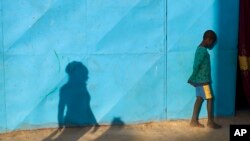GENEVA —
The United Nations says conditions for hundreds of thousands of people in Mali continues to be fragile despite improvements in the security situation and better access to vulnerable people by aid agencies. The U.N. is appealing for $569 million to provide food, medical care and other life-saving assistance to millions of Malians emerging from years of conflict.
The United Nations reports that over the past year, Mali has gone through an extraordinary change. It says general security throughout the country improved enormously after the intervention of French and African forces in the conflict-ridden North.
Despite these changes for the better, it says millions of people continue to be in desperate need of assistance.
U.N. resident and humanitarian coordinator for Mali, David Gressly, said 800,000 people currently are suffering from severe food shortages and that figure is expected to rise to 1.3 million later in the year.
He notes lack of rain last year has produced a bad harvest. As a consequence, he said the so-called hunger season -- the period when people have run out of food stocks and can no longer cope -- is expected to start much earlier this year, perhaps by March or April.
Gressly said tens of thousands of malnourished children could die if they do not receive appropriate help in a timely manner.
“These children are truly in a very difficult situation. Treatment costs about $100 to save that life. It is not expensive and we can probably save, as I mentioned, about 50,000 lives this year. Nobody will notice if they die. I can tell you that right now because they will just die in peoples’ homes and these children. But, they will still die.”
Gressly says there is no war going on in Mali right now. Localized attacks, basic criminality and banditry, however, are creating instability and insecurity.
Islamist militants linked to al-Qaida sidelined the Tuareg rebellion against the government in 2012 and took over the region. French forces succeeded in ousting them. These militant groups remain in the north, though, and mount sporadic attacks against military installations.
Humanitarian coordinator Gressly said they do not pose much of a threat to the local population. But he said the general insecurity is discouraging internally displaced and refugee populations from returning to their homes.
“Of the 217,000 estimated IDPs [Internally Displaced Persons] in Mali, 60 percent of them are estimated to be in the north. So, they are back in their regions, but they have not gone back to their home locations largely because of concerns over insecurity. The same is true for refugee movements,” said Gressly.
As in the case with IDPs, Gressly said refugees are inhibited from returning home because of fear of insecurity and retribution. He said that only about 15,000 of the 168,000 refugees who have sought asylum in neighboring countries have returned to Mali.
The United Nations reports that over the past year, Mali has gone through an extraordinary change. It says general security throughout the country improved enormously after the intervention of French and African forces in the conflict-ridden North.
Despite these changes for the better, it says millions of people continue to be in desperate need of assistance.
U.N. resident and humanitarian coordinator for Mali, David Gressly, said 800,000 people currently are suffering from severe food shortages and that figure is expected to rise to 1.3 million later in the year.
He notes lack of rain last year has produced a bad harvest. As a consequence, he said the so-called hunger season -- the period when people have run out of food stocks and can no longer cope -- is expected to start much earlier this year, perhaps by March or April.
Gressly said tens of thousands of malnourished children could die if they do not receive appropriate help in a timely manner.
“These children are truly in a very difficult situation. Treatment costs about $100 to save that life. It is not expensive and we can probably save, as I mentioned, about 50,000 lives this year. Nobody will notice if they die. I can tell you that right now because they will just die in peoples’ homes and these children. But, they will still die.”
Gressly says there is no war going on in Mali right now. Localized attacks, basic criminality and banditry, however, are creating instability and insecurity.
Islamist militants linked to al-Qaida sidelined the Tuareg rebellion against the government in 2012 and took over the region. French forces succeeded in ousting them. These militant groups remain in the north, though, and mount sporadic attacks against military installations.
Humanitarian coordinator Gressly said they do not pose much of a threat to the local population. But he said the general insecurity is discouraging internally displaced and refugee populations from returning to their homes.
“Of the 217,000 estimated IDPs [Internally Displaced Persons] in Mali, 60 percent of them are estimated to be in the north. So, they are back in their regions, but they have not gone back to their home locations largely because of concerns over insecurity. The same is true for refugee movements,” said Gressly.
As in the case with IDPs, Gressly said refugees are inhibited from returning home because of fear of insecurity and retribution. He said that only about 15,000 of the 168,000 refugees who have sought asylum in neighboring countries have returned to Mali.




